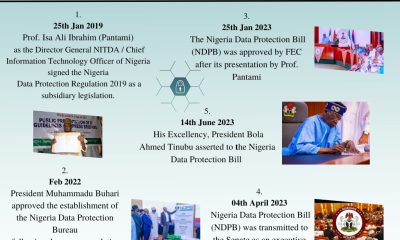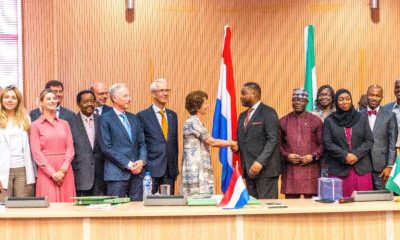Business
FG Lifts Ban On Cryptocurrency, Introduces Taxation Instead

Bitcoin and other cryptocurrencies have long been a topic of debate and regulatory scrutiny worldwide, and Nigeria has been no exception.
In February 2021, the Central Bank of Nigeria (CBN) issued a circular to deposit money banks (DMBs), non-bank financial institutions (NBFIs), and other financial institutions (OFIs) to close accounts of persons or entities involved in cryptocurrency transactions within their systems.
The CBN further warned local financial institutions against dealing in crypto-assets or facilitating payments for crypto exchanges.
The apex bank cited concerns over money laundering, terrorism financing, cybercrime and the volatility of cryptocurrencies as reasons for the ban.
The directive received significant backlash from the Nigerian public and the cryptocurrency community, as many saw it as a hindrance to technological advancement and economic growth.
However, just two years later, the government has taken a surprising turn by introducing taxation on cryptocurrencies.
Here is a timeline of major events in the two-year period that shaped the evolution of Nigeria’s stance on cryptocurrencies.
February 5,2021: CBN directs banks to close accounts of persons or entities involved in cryptocurrency transactions within their systems.
February 9, 2021: CBN launches investigation into financial institutions offering services to cryptocurrency traders.
February 11, 2021: The senate invites the CBN, the Securities and Exchange Commission (SEC) to discuss opportunities and threats of cryptocurrency on Nigeria’s economy and security.
February 18, 2021: The International Monetary Fund (IMF) backs CBN, says cryptocurrencies may be used for illegal activities.
February 22, 2021: The SEC says there is a need to regulate cryptocurrencies.
February 26, 2021: Yemi Osinbajo, Vice President of Nigeria, calls for a regulatory framework for cryptocurrencies rather than an outright ban.
March 21, 2021: The CBN clarifies its position on the ban and states that individuals are not prohibited from buying and trading crypto, just not through any Nigerian bank or fintech.
April 15, 2021: SEC says discussion is ongoing with the CBN over the regulation of cryptocurrencies.
April 26, 2021: The Economic and Financial Crimes Commission (EFCC) warns Nigerians to be cautious before investing in Bitcoin.
July 22, 2021: The CBN announces plans to launch the “ eNaira”—a central bank digital currency (CBDC) — which is quite different from Bitcoin and other cryptocurrencies.
October 25,2021: Nigeria becomes first African nation to launch a digital currency — the “eNaira”.
April 7, 2022: CBN hits six banks with a N1.3 billion fine over alleged non-compliance with its regulation on accounts of cryptocurrency traders.
May 15, 2022: The SEC recognises digital assets as securities and issues regulations on exchange and custody of cryptocurrencies in the country.
INTRODUCTION OF TAXATION ON CRYPTOCURRENCY
The federal government surprised many by announcing its decision to tax cryptocurrencies.
The government said it recognised the growing adoption and economic significance of digital assets and aimed to harness their potential for revenue generation.
By doing so, Nigeria joins the league of jurisdictions currently taxing digital assets, including the United Kingdom, the United States of America, Australia, India, Kenya and South Africa.
December 2, 2022: Zainab Ahmed, minister of finance, budget and national planning, says there is a provision to tax cryptocurrency and other digital assets in the latest finance bill.
May 28, 2023: President Muhammadu Buhari signs the 2023 finance bill into law. The law introduces a 10 percent taxation of gains on the disposal of digital assets including cryptocurrency. The law is effective as of May 1, 2023.
Business
Seplat Energy celebrates a decade of Dual Listing with Bell Ringing Ceremony at Nigerian Stock Exchange
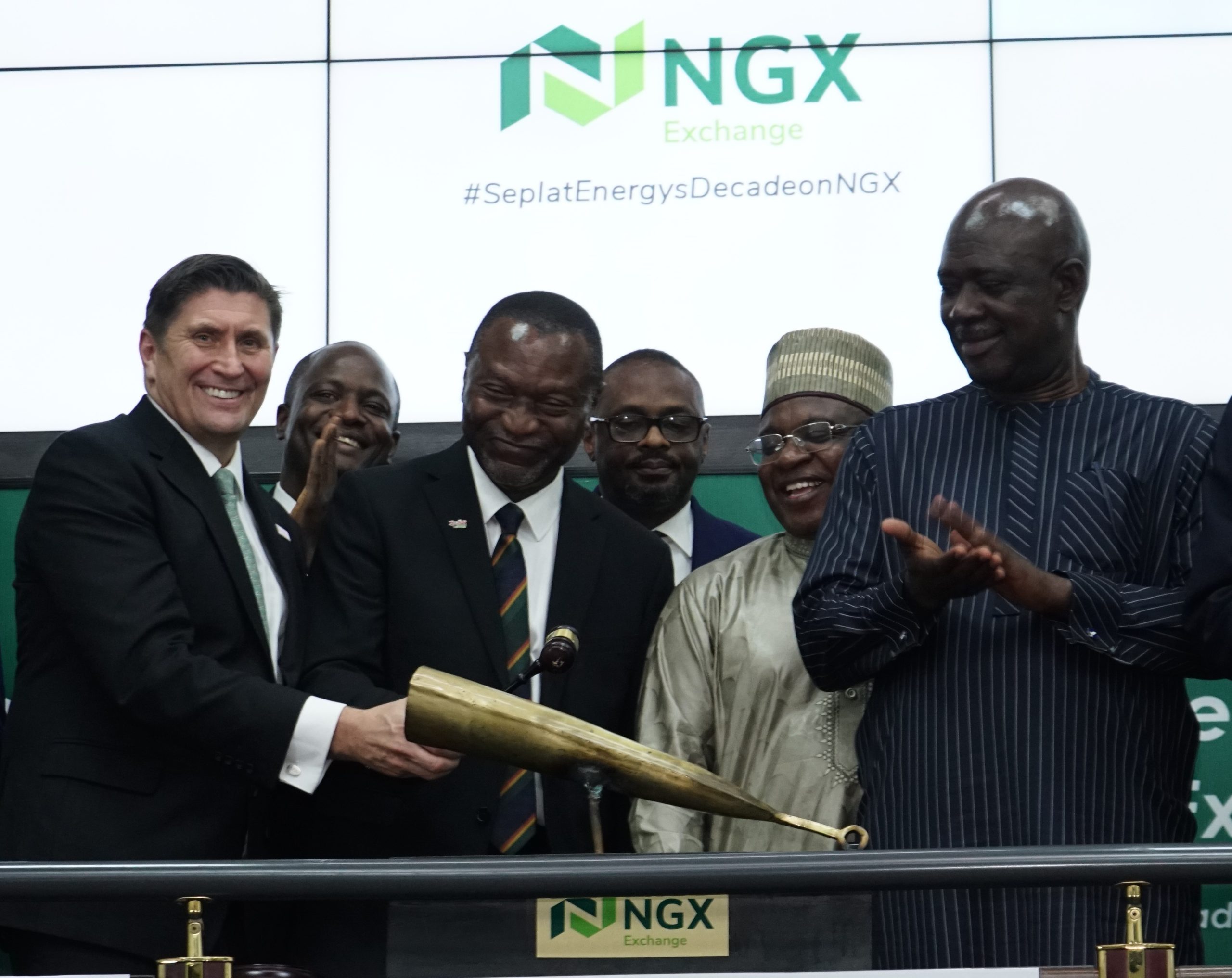
[L-R: Mr. Roger Brown, CEO Seplat Energy Plc; Mr. Temi Popoola, Group CEO, Nigerian Exchange (NGX) Group; Mr. Udoma Udo Udoma, Board Chairman, Seplat Energy Plc; Mr. Jude Chiemeka, Ag. CEO, NGX; Alhaji (Dr.) Umaru Kwairanga, Group Chairman, NGX Group; Sen. Heineken Lokpobiri, Hon. Minister of State for Petroleum Resources (Oil), at the NGX Closing Gong Ceremony to mark a Decade of Listing of Seplat Energy on the NGX and the London Stock Exchange … on Tuesday]
The Nigerian Exchange (NGX) reverberated with the jubilant sound of the bell as Seplat Energy PLC, a leading independent indigenous energy company, celebrates a significant milestone – a decade of its dual listing on both the Premium Board of the Nigerian Exchange (NGX) and the Main Market of the London Stock Exchange (LSE). This commemorative event, attended by esteemed representatives from Seplat Energy, the NGX, the Nigeria government, and other institutional partners, marks a decade of strategic partnership and commitment to excellence in the energy sector.
During his speech at the anniversary, Mr. Roger Brown, CEO, Seplat Energy, expressed delight over the feat, reiterating Seplat Energy’s commitment to leading Nigeria’s energy transition, adding that the power of indigenous companies is to bring growth and prosperity to their home countries and the people. “One example of how Seplat Energy is making an enduring difference to Nigeria and host communities where we operate is that nearly $50m had been invested by our Joint Venture partnerships in communities since our inception to date,” Brown said.
“Truly, Seplat Energy has delivered significant value by enhancing strategic, operational and financial achievements in 10 years as a listed company,” he added.
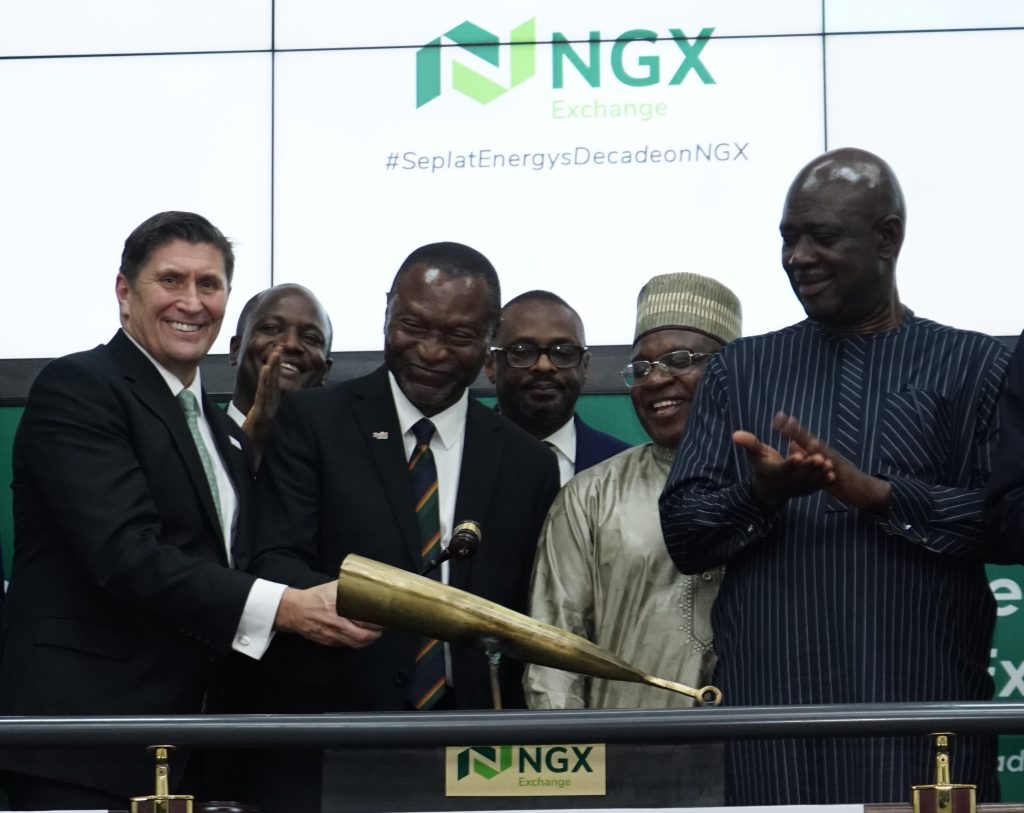
Sen. Heineken Lokpobiri, Hon. Minister of State for Petroleum Resources (Oil); Alhaji (Dr.) Umaru Kwairanga, Group Chairman, NGX Group; ; Mr. Udoma Udo Udoma, Board Chairman, Seplat Energy Plc; Mr. Roger Brown, CEO Seplat Energy; and Mr. Bello Rabiu, Senior Independent Non-Executive Director, Seplat Energy, lead other Directors and Management of Seplat Energy, at the NGX Closing Gong Ceremony to mark a Decade of Listing of Seplat Energy on the NGX and the London Stock Exchange … on Tuesday
In his comments, Mr. Temi Popoola, CEO, NGX Group, emphasized the significance of Seplat Energy’s decade of dual listing stating, “If we were to look back to our market and tried to find landmarks, the last major landmark you will find in the last ten years is this transaction that we are celebrating today, and the market is very grateful for that”.
Congratulating Seplat Energy on this milestone, in his welcoming remarks, Alhaji (Dr.) Umaru Kwairanga, NGX Group Chairman, highlighted the importance of partnerships between the NGX and companies like Seplat Energy in driving economic growth and development stating that “Seplat’s journey symbolises resilience, innovation, and a commitment to excellence, making them a beacon of corporate governance and operational expertise. Seplat Energy has emerged as a leading indigenous energy company, deeply integrated into Nigeria’s economic landscape and the NGX Group remains committed to supporting companies like Seplat Energy as they drive economic growth and contribute to our nation’s prosperity”.
Reflecting on the significance of the decade of dual listing, Mr. Udoma Udo Udoma, Board Chairman, Seplat Energy remarked, “Seplat Energy is committed to driving Nigeria’s transition to sustainable and affordable energy, harnessing its power to improve lives by transforming the economy. We have ambitious goals. We are investing in Nigeria. We will support the federal government’s energy transition policy, and we will partner with FG in whatever area they want us to do so. That is our commitment. We will grow Seplat while also maintaining the highest standard of corporate governance”.
Also commending Seplat Energy on the decade of listing, Jude Chiemeka, Acting CEO, NGX stressed the importance of the capital market in helping companies raise funds and creating wealth for all, stating that “Seplat Energy was listed at 576 Naira at listing and yesterday it closed at 3,370 which is an increase of over 484%. The figures show that in the last 10 years, the company has paid out $575m in dividend payments to shareholders in Nigeria and London where they are also listed, so this company has given investors a huge opportunity to really participate in wealth creation. Reports show that Nigeria would be among the top 20 countries in the next 25 years, and I think Seplat is poised to be one of the institutions driving growth, prosperity, and inclusion in our nation”.
Also gracing the closing gong ceremony was Sen. Heineken Lokpobiri, Minister of State, Petroleum Resources (Oil), who gave kudos to Seplat Energy on their laudable achievements while also assuring of the Federal Government’s commitment to providing support to the company. “I am happy to be part of today’s celebration and Seplat’s exceptional performance in the last ten years and as Minister of State, Petroleum Resources, I assure that we will partner with Seplat to expand their investments, not only for the benefit of its shareholders, but also for Nigeria. The least the government can do anywhere in the world is to create an environment where companies like Seplat continue to thrive”.
Seplat Energy remains focused on driving value for its shareholders, pursuing strategic acquisitions, and championing sustainable practices in the energy sector, with ongoing projects such as the acquisition of Mobil Producing Nigeria Unlimited and the development of the ANOH Gas processing plant. The company’s diversified portfolio, including eight onshore and shallow water assets strategically located in the Niger Delta region, has enabled it to maximize hydrocarbon production while actively contributing to Nigeria’s energy security and economic development.
Seplat Energy’s robust gas portfolio, highlighted by the ANOH Gas processing plant project, underscores its pivotal role in Nigeria’s transition to gas. This aligns with Nigeria’s broader energy goals, promoting cleaner energy sources, reducing reliance on traditional fossil fuels and driving a greener and more sustainable energy landscape in Nigeria.
With commitment to corporate governance, corporate citizenship, and making significant corporate social investments, as reflected in its rigorous approach to performance assessment and its investment in community development initiatives, Seplat Energy is poised for continued success in the years to come.
Business
Naira Appreciates To ₦1,280/$ At Parallel Market
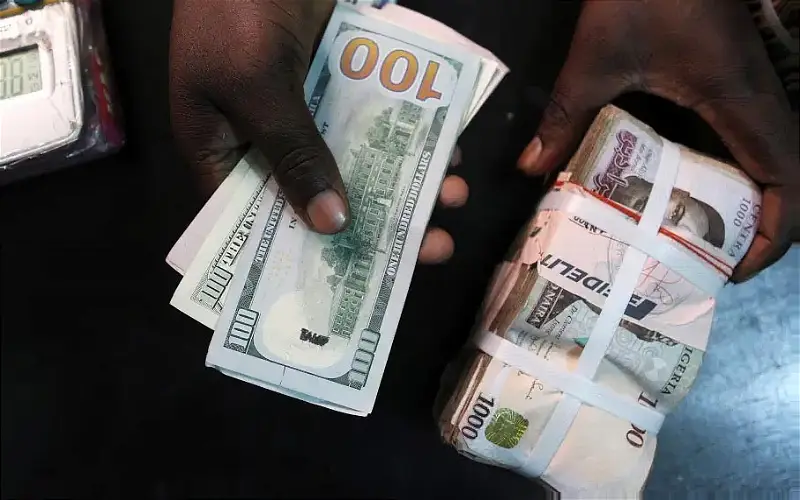
The naira, on Friday, appreciated to N1,280 per dollar at the parallel section of the foreign exchange (FX) market.
The current FX rate signifies a 5.19 percent appreciation from the N1,350/$ reported on March 27.
Currency traders in Lagos, also known as bureau de change (BDCs) operators, quoted the buying rate of the greenback at N1,260 and the selling price at N1,280 — leaving a profit margin of N20.
“The price of the dollar as well as other major currencies have been falling. It is affecting our business as some customers prefer to keep their currencies than change it with us,” a currency trader identified as Aliyu told TheCable.
At the official section of the FX market, the local currency depreciated by 0.69 percent to N1,309.39/$ on March 28 — from N1,300.43/$ on March 27.
Meanwhile, the Central Bank of Nigeria (CBN), on March 29, said the economy recorded over $1.5 billion in foreign exchange (FX) inflow this month, indicating its monetary policy initiatives are effective.
The apex bank said the naira is headed in the right direction, and the administration of Yemi Cardoso, CBN governor, remains committed to ensuring the stability of the market and the appropriate pricing of the naira against other major currencies worldwide.



